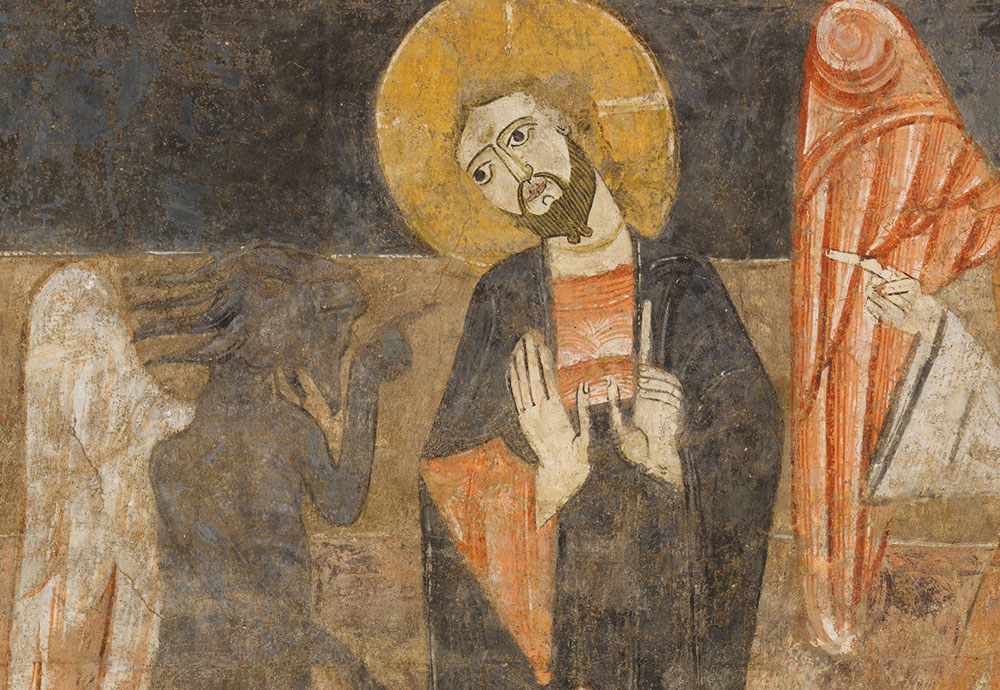
A 12th-century Spanish fresco depicts the temptation of Christ by the devil. (Metropolitan Museum of Art/The Cloisters Collection and Gift of E.B. Martindale)
"Jesus was led by the Spirit into the desert to be tempted by the devil." Now that's a mind-blowing sentence!
Was Jesus really tempted? Doesn't temptation imply a confusion or indecisiveness that seems uncharacteristic of Jesus? Was he really that human? Another question: Why did the Spirit lead Jesus to temptation? Didn't Jesus teach us to beg God not to do that?
In response to the first question, the Gospels of Matthew, Mark and Luke all clearly say that Jesus experienced temptation in the desert. These three Gospels, called synoptic because they follow a similar pattern, paint a very human portrait of Jesus. John, in contrast, portrays Jesus as keenly aware of his divine origin and destiny.
In addition, the word tempt has two related meanings: to put one to the test, or to manipulate someone in an effort to coach them into wrongdoing. Our opening line includes both definitions: The Spirit led Jesus to test his identity; the devil attempted to manipulate him to be untrue to it.
What is at play here — and in the whole of the Gospels — is Jesus' identity as son of God. Matthew began his Gospel with the genealogy, a description of Jesus' origins in the people of God. Now diabolos (the proper name of the chief of the demons) comes to direct him about how to fulfill his vocation among them.
We should note that this scene comes immediately after Jesus rose from baptism and heard the voice of God say, "This is my beloved Son, with whom I am well pleased." It seems that, following his choice to be baptized, Jesus' experience of the Spirit impelled him to explore and clarify what it meant to be son of God. Baptism led him to confront everything implied in the word temptation.
The temptations are archetypal with a great variety of interpretations and applications. For today, we might see them as tapping into the same confusing desires the snake used to snag Eve and Adam.
In the Genesis story, the snake told Eve that eating the forbidden fruit would make her/them like gods. The serpent mastered them, not because they were proud, but because they failed to recognize that they were already like the God who had breathed life into them and created them in the divine image. They got caught in a frenzy of trying to achieve for themselves what they had already been given for free.
Advertisement
Diabolos, a one-hit wonder, tried the same trick on Jesus. The first two temptations begin with the phrase, "If you are son of God," with the implication that the tempter could define what that meant. The third temptation drops all pretense of faithfulness and offers an alternative life. We might think of them this way:
Diabolos: "If you are son of God, get the rocks out of your head! Hunger, thirst, and dependence on others are beneath you!"
Jesus: "A son of God revels in relationship. Both sides feed on the risk of being vulnerable to want and thus find greater fulfillment."
Diabolos: "If you are the true son, God should keep you safe, even from your own pretentious foolishness."
Jesus: "A son of God seeks God's will — and that's worth dying for."
Diabolos: "Forget this God business! Look around and admit it. Mine is the only power that runs the world.
Jesus: "Stay in your own hell if you wish. I have no power to stop you."
Jesus' temptations were not a one-time event, nor simply an experience in the desert and then the Garden of Gethsemane. In some form, they summarize all the ways he and any of us can distort our vocation to be images of God.
Diabolos' insistence that we need to assure our own bread and security diverts our attention from the truth that when anyone is hungry or in danger, not only are all in need, but all have the ability to respond in a way that privileges solidarity over selfishness.
Diabolos' suggestion that religion is meant to be our safety net perverts Christianity, prioritizing self-preservation over self-giving. The appeal to raw power promotes the sham of fear-induced unity and control; it betrays and rejects the ways of the God of love. Most of all, it cannot endure.
As we begin this Lenten season, let us pray that we may recognize and reject the ways we, our church and our society, are continually tempted to betray our vocation to be images of God. Lent is our time to reappropriate our own baptismal commitment and to confront and expose Diabolos' machinations. In the end, we hope to join Jesus in telling Diabolos, "Dwell in your hell. We've got a better option."





